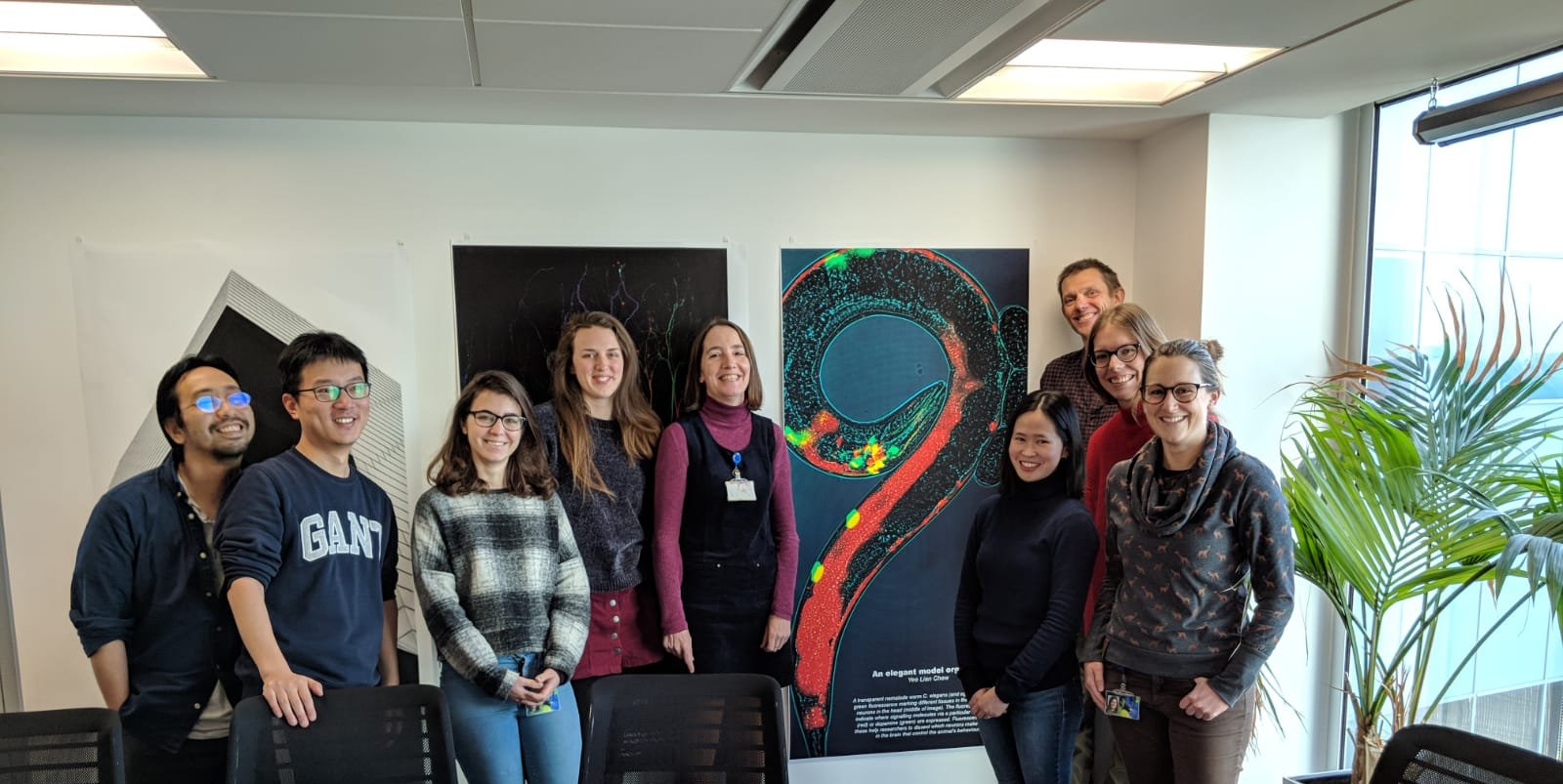People in the Schafer lab (2019):
Group photo (Dec 2018):

|
|
Bill Schafer - Principal Investigator Nationality: American/British I am currently writing papers, messing around in the lab, and thinking about new plans. If you have any questions about the lab, send me an email! wschafer[at]mrc-lmb.cam.ac.uk |
|
|
Denise Walker - Research Scientist Nationality: British A central theme of my previous postdoctoral research has been to combine protein biochemistry with functional and behavioural assays, to elucidate the role of protein interactions in influencing the function of ion channels, in both mammals and C. elegans. The focus of my research since I joined Bill’s lab has been to better understand the mechanisms of mechanosensation, using the (gentle) touch receptor neurons and the multifunctional nociceptor neurons of C. elegans. I am using a combination of calcium imaging, behavioural assays, optogenetics and protein interaction studies to identify novel components of the mechanostransduction machinery, and to understand the molecular and cellular basis for the distinct localisation and functional properties of the different mechanotransducers. As lab manager, I also curate our strain and plasmid collections. dwalker[at]mrc-lmb.cam.ac.uk |
|
|
Eva Kaulich - Grad Student Nationality: German I joined Bill’s lab in 2017 as a PhD student. I am interested in how expression of ion channels (or the lack thereof) affect excitability of neurons and tissues, and ultimately how it affects behaviour of the whole organism. I am particularly interested in the role of protons in signal-transduction and in the diverse group of C. elegans Degenerin/Epithelial Sodium Channels (DEG/ENaCs). In order to address these questions, I am in the process of characterising the acid-sensing properties of C. elegans DEG/ENaCs in vitro in Xenopus oocytes as well as in vivo in the worm. My research in C. elegans focuses on the role and expression pattern of these channels in dauers, a special stress resistant larval stage, which I use to model plasticity in worms. I am also investigating the behavioural phenotypes in mutants that lack these ion channels. I am using a combination of Two-Electrode-Voltage Clamp in Xenopus oocytes, microfluidic calcium imaging and behavioural assays in C. elegans. What’s it like to be a PhD student at the LMB? ekaulich[at]mrc-lmb.cam.ac.uk |
|
|
Xinyi Yang - Post-doc Nationality: Chinese This is Xinyi. xyang[at]mrc-lmb.cam.ac.uk |
|
|
Lidia Ripoll Sanchez - Student Nationality: Spanish This is Lidia. lsanchez[at]mrc-lmb.cam.ac.uk |
|
|
Julia Morud Lekholm - Post-doc Nationality: Swedish My PhD work involved studying the effect by nicotine on different ligand-gated ion channels in rodents, this theme is something that I’m now continuing on with in Bill’s lab where I study orphan ligand-gated ion channels in C. elegans. I’m doing this through the combination of different electrophysiological, behavioural and molecular biology techniques. juliam[at]mrc-lmb.cam.ac.uk |
|
|
Akihiro Mori - Post-doc (Rutherford fellowship) Nationality: Japanese This is Aki. amori[at]mrc-lmb.cam.ac.uk |
|
|
Iris Hardege - Post-doc Nationality: German This is Iris. ihardege[at]mrc-lmb.cam.ac.uk |

|
Yiquan Tang - Post-doc Nationality: Chinese This is Yiquan. :) ytang[at]mrc-lmb.cam.ac.uk |

|
Chris Barnes - Grad Student (joint-student at the HHMI Janelia Farm) Nationality: Chris is interested in using computer vision to understand the nervous system of C. elegans. cbarnes[at]mrc-lmb.cam.ac.uk |
Alumni